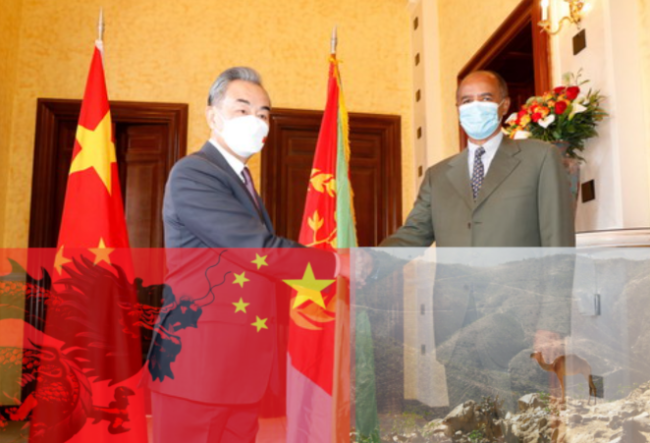Radio Erena: 12 January 2022

The visit of the Chinese State Councilor and Foreign Minister Wang Yi to Asmara on Jan. 5, was a rare occasion for President Isias Afwerki to display his admiration for China’s exemplary development model and to exchange his reminisces of his stay in China in the late 1960s.
Shortly after abandoning his studies at Addis Ababa University in 1966, the young engineering student Isias Afewerki joined the Eritrean Revolution and was sent with his comrade-in-arms Ramadan Mohamed Nur, who passed away last months, at 83, to Chairman Mao’s China for political and military training.
Compared to most of the fighters at that period, both Ramadan and Isias had ample university education: Ramadan studied law at Cairo University. Sending Isias to China was more due to political calculations than out of the outstanding personal or revolutionary performance.
The War of the Peoples’ Army
The Eritrean Liberation Front (ELF) opted for sending him to avoid his denunciation of its prevalent policies, which he depicted as corrupt and anti-Christian.
Little is known about the fighters’ training in China, however, confirmedly they brought back with them the ‘germ’ of Communism (as it’s spitefully put by conservative ELF die-hards,) and subsequently worked to vertically shred ELF from head to feet by establishing the Eritrean People’s Liberation Front, the pro-Marxist rival that succeeded in undermining ELF in the early 1980s. For ten years, Ramadan served as the EPLF Secretary-General, but his Assistant Secretary-General, Afwerki had unquestionable control of the military, intelligence, logistics, and finance of the organization leaving his senior with pathetic nominal powers.
Chinese influence was everywhere in the vanguard revolutionary organization from ideology to day-to-day working codes. The Eritrean People’s Liberation Army, EPLA, modeled after Mao’s People’s Red Army, was the striking force that defeated the Ethiopian army and secured the independence of the country in 1991.
The Red Dragon Model
After independence ‘Betsai’ (Comrade) Isias Afewerki, in a Mao-like power grab became the Head of the Provisional Eritrean Government in addition to his post as the chairperson of the EPLF and the supreme commander of the armed forces.
Taking China as a role model, he doesn’t allow the establishment of political parties; or the growth of a private sector as the party-owned companies wield absolute control over the impoverished economy. As in China, freedom of movement between towns and regions in Eritrea is not allowed without permission. Traveling abroad is only allowed after obtaining an Exit Visa from Immigration Department. Moreover, China and Eritrea share disgraceful records of suppressing private press and indefinite incarnation of journalists.
Kim Jong-un and Isias Afwerki have excellently copied the murkiest features of the Chinese experience. No wonder Eritrea wins the praises of China as an example for other ‘independent’ African nations.
Music to Chinese Ears
One can write a tome on the dismaying similarities between Eritrea and China: the demi-god leaders, terrorizing of citizens, the illusions of self-worth, etc.
Xinhua, Chinese News Agency, quoted the must-do list of the visiting minister to Horn of Africa countries: “First, the Horn of Africa countries should strengthen intra-regional dialogue to overcome sovereignty challenges.” He arrogantly instructed. In Nairobi, his next stop in a three-state visit he advised African countries to: “follow the path of unity, self-improvement and hold the region’s fate in their hands through equal consultations and staying away from major countries competitions.” As if his visit has nothing to do with states’ competitions.
Hailing China as the rising inheritor of the American rapidly fading global empire, president Isias assuredly confirmed to the visiting minister his country’s confident use of the Chinese development experience.
The wording of the joint communique issued in the aftermath of the foreign minister’s visit was a cliché that wasn’t only a mark of political hypocrisy, but it rather played the tunes the Chinese ‘comrades’ liked to hear: “ Both sides agreed to uphold the common values of peace, development, fairness, justice, democracy, and freedom for all mankind, and oppose hegemonic interference in the internal affairs of other countries under the pretext of democracy and human rights.” A reflection of despicable banality, especially where the two countries’ bleak records speak louder than words.
Eritrea under Afwerki makes a deformed clone of China. Absorbing all the injurious aspects of the Chinese experience, the Eritrean people are paying the price. Furthermore, China’s cooperation with African states serves only the corrupt leaders at the expense of the mass population. The depleting extractive economy in Eritrea is the best example (China “invests” in mining, oil exploration, and fisheries.) Financially, Beijing doesn’t care who benefits from its generous loans so long as they submerge the African countries in debts that undermine states’ sovereignty. Are Western debt systems any better? Far from it; but Chinese development strategies are not of any use to the continent’s peoples (China built more than 20 lavish presidential palaces across Africa, including the African Union building in Addis Ababa.) Officials’ visits and joint communique cast shiny images, but the realities on the ground are painfully different.
By Fathi Osman
================
